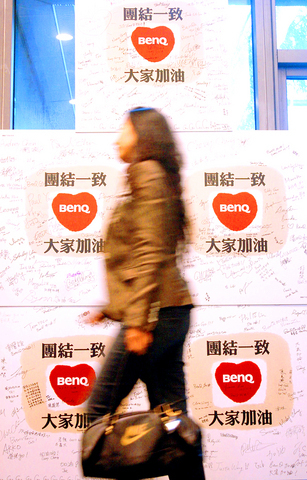BenQ Corp (明基) said yesterday its fourth quarter losses had widened to NT$7.89 billion (US$238 million) from a year ago, dragged down by the unsuccessful takeover of Siemens AG's unprofitable mobile phone unit.
Taking responsibility for the turn of events, chairman Lee Kun-yao (
"The board wants him to stay and hopes he will help the company turn around as soon as possible," Wang said.

PHOTO: CHANG CHIA-MING, TAIPEI TIMES
Lee, who did not attend the conference, was trying to keep a low profile amid recent insider-trading probes. Lee was barred from traveling abroad while Eric Yu (游克用), a senior financial executive, was detained by prosecutors.
BenQ said the company's losses had reached NT$7.89 billion during the period of October to December last year, from NT$6 billion a year ago.
However, this represented a contraction from NT$12.22 billion in losses in the third quarter after the company stopped investing in the money-losing mobile phone unit last September, less than two years after the takeover.
The fourth-quarter losses were due to high non-operating expenses amounting to NT$6.72 billion, including NT$4 billion for one-time after-sale customer services and maintenance and NT$1 billion for royalties, financial executive David Wang (王淡如) said.
Overall, losses last year spiked to NT$27.61 billion, or NT$10.78 a share, compared to NT$5.23 billion, or NT$2.12 a share, in 2005.
"We believe the first quarter is the bottom point. Business will improve quarter by quarter [after the split of the contract and brand businesses]," Jerry Wang said.
"We could return to profits in the fourth quarter," he said.
Despite BenQ's blueprint, investors remained concerned over speculation that the company was becoming a target for hostile takeovers in the wake of heavy trading volume last Thursday.
"BenQ will only have few opportunities in terms of core business. The company's remaining value rests in its potential for a merger," said Vincent Chen (陳豊丰), an analyst at CLSA Ltd in Taipei.
Investors could attempt to take over BenQ as only a small number of investors would be interested in buying its stocks, Chen said.
Jerry Wang said that "no interesting parties have approached us yet."
BenQ said that its net value was close to NT$17 a share.
This included the company's long-term investments such as AU Optronics Corp (友達光電), the world's third-biggest maker of liquid-crystal-display panels.
BenQ stocks dropped 6.19 percent to NT$13.65 yesterday, against a 0.02 percent decline at the benchmark TAIEX index.
Revenues plunged 48 percent annually, or 15 percent on a quarterly basis, to NT$34.6 billion during the final quarter of last year, with handset contribution down to to 4 percent from 42 percent at its peak.
Taiwan Ratings Corp (
However, ratings on BenQ could be under pressure if the company failed to improve its handset business unit over the short to medium term, Taiwan Ratings said.

BYPASSING CHINA TARIFFS: In the first five months of this year, Foxconn sent US$4.4bn of iPhones to the US from India, compared with US$3.7bn in the whole of last year Nearly all the iPhones exported by Foxconn Technology Group (富士康科技集團) from India went to the US between March and last month, customs data showed, far above last year’s average of 50 percent and a clear sign of Apple Inc’s efforts to bypass high US tariffs imposed on China. The numbers, being reported by Reuters for the first time, show that Apple has realigned its India exports to almost exclusively serve the US market, when previously the devices were more widely distributed to nations including the Netherlands and the Czech Republic. During March to last month, Foxconn, known as Hon Hai Precision Industry

Taiwan Semiconductor Manufacturing Co (TSMC, 台積電) and the University of Tokyo (UTokyo) yesterday announced the launch of the TSMC-UTokyo Lab to promote advanced semiconductor research, education and talent development. The lab is TSMC’s first laboratory collaboration with a university outside Taiwan, the company said in a statement. The lab would leverage “the extensive knowledge, experience, and creativity” of both institutions, the company said. It is located in the Asano Section of UTokyo’s Hongo, Tokyo, campus and would be managed by UTokyo faculty, guided by directors from UTokyo and TSMC, the company said. TSMC began working with UTokyo in 2019, resulting in 21 research projects,

Ashton Hall’s morning routine involves dunking his head in iced Saratoga Spring Water. For the company that sells the bottled water — Hall’s brand of choice for drinking, brushing his teeth and submerging himself — that is fantastic news. “We’re so thankful to this incredible fitness influencer called Ashton Hall,” Saratoga owner Primo Brands Corp’s CEO Robbert Rietbroek said on an earnings call after Hall’s morning routine video went viral. “He really helped put our brand on the map.” Primo Brands, which was not affiliated with Hall when he made his video, is among the increasing number of companies benefiting from influencer

Quanta Computer Inc (廣達) chairman Barry Lam (林百里) yesterday expressed a downbeat view about the prospects of humanoid robots, given high manufacturing costs and a lack of target customers. Despite rising demand and high expectations for humanoid robots, high research-and-development costs and uncertain profitability remain major concerns, Lam told reporters following the company’s annual shareholders’ meeting in Taoyuan. “Since it seems a bit unworthy to use such high-cost robots to do household chores, I believe robots designed for specific purposes would be more valuable and present a better business opportunity,” Lam said Instead of investing in humanoid robots, Quanta has opted to invest